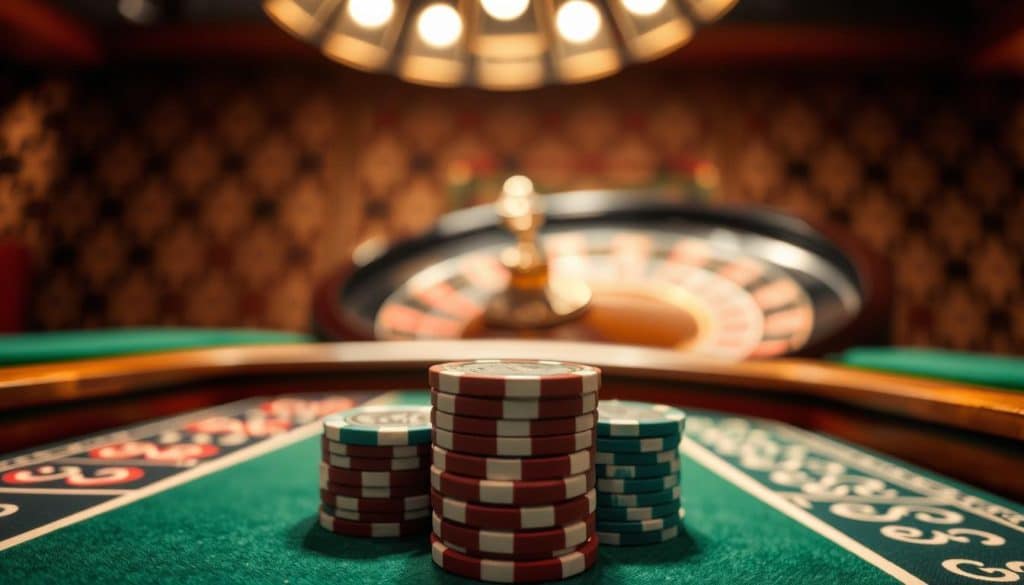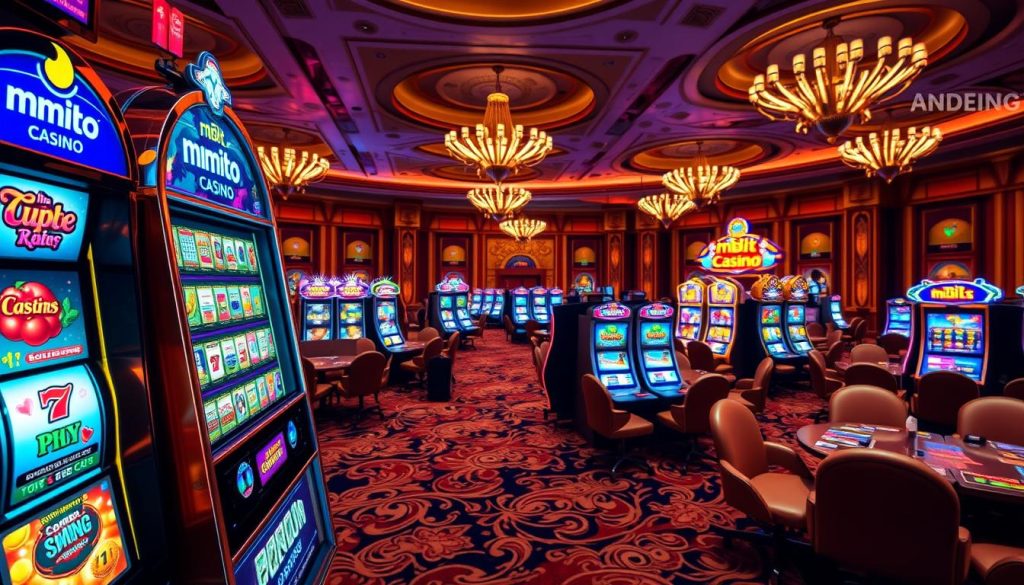European roulette has a house edge of 2.7%. This means casinos keep about three cents of every dollar wagered. These odds are better than most casino games. Yet, many players still lose their money.
I’ve played roulette across New Zealand and online for years. My experience shows that strategy isn’t about beating the system. It’s about smart bankroll management and knowing when to stop.
This guide offers practical advice based on real gameplay. No magic formulas or guaranteed wins here. Just honest tips for approaching New Zealand casino games wisely.
The math behind roulette is the same everywhere. This applies to SkyCity casinos and online platforms. We’ll explore betting systems, probability basics, and smart bankroll management for Kiwi players.
Key Takeaways
- European roulette offers better odds than American versions with its 2.7% house edge versus 5.26%
- No betting system can overcome the mathematical house advantage in the long run
- Effective bankroll management extends your playing time and protects against rapid losses
- Understanding probability helps set realistic expectations for both wins and losses
- Online roulette NZ platforms offer practice modes to test approaches without risking real money
- Emotional discipline matters more than any betting pattern or system
Understanding Roulette: A Game of Chance and Skill
Many New Zealand players lose money by skipping roulette fundamentals. They bet on gut feelings, quickly depleting their bankroll. Roulette mixes chance with strategy, and knowing the difference is crucial.
The roulette table layout determines your odds on every bet. Understanding this system is key to developing a meaningful strategy.
Knowledge, not hope, should guide your decisions at the table.
What is Roulette?
Roulette is a casino game where players bet on where a ball will land. It involves a spinning wheel with numbered pockets. Success requires understanding probability, bet types, and bankroll management.
My first roulette experience in Wellington was confusing. The croupier had to explain inside and outside bets multiple times.
Each spin is independent, unconnected to previous outcomes. This fact is crucial for making smarter betting decisions.
“The essence of gambling is the illusion of control over uncertainty.”
Recognizing true randomness helps you make better bets. Serious players focus on bet selection rather than predicting specific numbers.
Types of Roulette Games
There are three main roulette variants, each impacting your long-term results differently. Understanding these differences can significantly improve your chances of success.
European roulette has 37 pockets numbered 0 through 36. The single zero gives the house a 2.7% edge, offering the best odds.
American roulette adds a double zero (00), totaling 38 pockets. This doubles the house edge to 5.26%, causing faster losses.
French roulette uses a 37-pocket wheel with special rules. These rules can further reduce the house edge on certain bets.
| Roulette Type | Number of Pockets | House Edge | Best For |
|---|---|---|---|
| European | 37 (single zero) | 2.7% | Most players |
| American | 38 (double zero) | 5.26% | Avoid if possible |
| French | 37 (single zero) | 1.35% (even money bets) | Experienced players |
The european roulette advantage is substantial in long-term play. Betting $10 per spin, you lose $27 on European versus $53 on American roulette per 100 spins.
Choosing the right table can save you real money. When looking to win big at top casino sites, opt for European roulette.
How Roulette Works
Understanding casino wheel mechanics helps you appreciate effective strategies. The croupier spins the wheel and launches the ball in opposite directions.
The ball eventually settles into a pocket, determining the winning number. The roulette table layout shows all betting options.
Inside bets target specific numbers, offering higher payouts but lower probability. Outside bets cover larger groups, providing better odds but smaller returns.
Here’s what you need to know about the betting structure:
- Straight up bets pay 35:1 but only hit 2.7% of the time on European wheels
- Split bets cover two adjacent numbers, paying 17:1 with 5.4% probability
- Street bets span three numbers horizontally, offering 11:1 payouts
- Outside bets like red/black pay 1:1 but win nearly 48.6% of the time
Casino wheel mechanics ensure randomness through precision engineering. Modern wheels are balanced to microscopic tolerances, eliminating predictable bias.
In regulated casinos, trying to find wheel bias is wasted effort. The randomness is genuine, maintained through regular maintenance.
Understanding bet types, payouts, and probability is crucial. This knowledge forms the foundation for every legitimate roulette strategy.
Essential Roulette Strategies for Beginners
Having a solid betting framework boosts your confidence when you’re new to roulette. It transforms your approach from chaotic to calculated. These strategies help manage your money and extend your playing time.
Three time-tested systems have been used by thousands of players worldwide. They won’t eliminate the house edge but provide structure for better money management.
The Progressive Doubling Approach
The martingale system is a simple concept for even-money bets like red/black or odd/even. You double your bet after each loss. When you win, you recover all previous losses plus your original stake.
Here’s how the martingale system plays out in practice:
- Bet 1: Start with $10 on red—you lose
- Bet 2: Double to $20 on red—you lose again
- Bet 3: Double to $40 on red—still losing
- Bet 4: Double to $80 on red—finally win
- Result: You’ve wagered $150 total and won back $160, netting $10 profit
The problem arises during longer losing streaks. Your bankroll needs to be large enough to handle these situations. Table limits will eventually stop you, regardless of your money.
The martingale system works well for short sessions with moderate luck. Know your limits before you start using this strategy.
The Mathematical Sequence Method
The Fibonacci sequence gambling approach is more measured than aggressive doubling. You follow the Fibonacci sequence: 1, 1, 2, 3, 5, 8, 13, 21, 34, and so on.
Each number equals the sum of the previous two. Move one step forward after a loss and two steps backward after a win.
Here’s a practical Fibonacci sequence gambling example:
- Bet 1 unit ($10) and lose—move to position 2
- Bet 1 unit ($10) and lose—move to position 3
- Bet 2 units ($20) and lose—move to position 4
- Bet 3 units ($30) and win—move back two positions to position 2
- Bet 1 unit ($10) and continue the pattern
This system has a slower progression rate, making it easier on your bankroll. However, it takes longer to recover losses because you move backward two steps but forward only one.
The Fibonacci strategy is good for longer casino sessions when you want to stretch your bankroll. It requires patience and discipline for extended play.
The Balanced Equilibrium System
The d’Alembert method balances aggressive and conservative approaches. It’s based on the idea that wins and losses should eventually balance out.
Increase your bet by one unit after a loss, decrease by one unit after a win. It’s simple and doesn’t require complex sequences or dramatic doubling.
| Bet Number | Units Wagered | Outcome | Next Bet |
|---|---|---|---|
| 1 | 5 units | Loss | 6 units |
| 2 | 6 units | Loss | 7 units |
| 3 | 7 units | Win | 6 units |
| 4 | 6 units | Win | 5 units |
The d’Alembert method is suitable for beginners because it doesn’t require massive bet increases. You can maintain this system for hours without significant bankroll swings. This reduces emotional stress that often leads to poor decisions.
Players using this approach tend to last longer at the table. They seem to enjoy the experience more during casino sessions.
None of these systems change the fundamental house edge. European roulette has a 2.7% edge, while American roulette sits at 5.26%. These strategies provide frameworks for managing your bets and bankroll more effectively.
Beginners who adopt structured approaches tend to make smarter decisions overall. They follow a plan rather than reacting emotionally to each spin. This discipline alone improves the entire gambling experience.
Advanced Roulette Strategies for Experienced Players
Advanced roulette tactics require a different mindset than simple strategies. They demand discipline, math skills, and honest self-assessment. These methods need a larger bankroll and stronger emotional control.
Advanced roulette methods aren’t magic formulas. They’re calculated approaches that match risk tolerance and playing style. You’ll need to know when to walk away, even if the system says otherwise.
The James Bond Strategy
The James Bond Strategy breaks from traditional progressive betting patterns. It’s a flat betting system covering over two-thirds of the table. You need $200 per spin (about NZD $320) split across three bets.
Here’s how it works:
- $140 on the high numbers (19-36) – this is your primary coverage
- $50 on the six-line (13-18) – covering the middle section
- $10 on zero – insurance against the house number
This pattern covers 25 out of 37 numbers on a European wheel. You’ll win about 67% of spins, but losses can be significant when uncovered numbers hit.
The James Bond method creates momentum and confidence. But the math remains unchanged – you still face the standard 2.7% house edge. Extended play always regresses toward the statistical mean.
Covering the Board
This approach extends the James Bond concept further. You develop bet combinations that cover large wheel sections while leaving specific numbers exposed. It’s about creating sector-based coverage that eliminates neighbor numbers.
One example: place corner bets on 0-1-2-3 and 32-33-35-36, with a street bet on 16-17-18 and splits on 8-9 and 26-27. This covers 15 numbers spread across the wheel’s geography.
These aren’t progressive betting systems. You’re building layers of bets rather than increasing stakes after losses. The variance becomes extreme, requiring a significant bankroll to survive cold streaks.
Bankroll Management
Proper bankroll management is crucial for serious strategists. Never risk more than 5% of your total bankroll on a single session. Divide your session amount into at least 40 base betting units.
Advanced players understand that survival is the first goal. Track every session in a spreadsheet, noting bankroll changes, time played, and system used. This data reveals important patterns.
Set strict stop-loss and stop-win limits. Walk away if you lose 50% of your session bankroll. If you double it, pocket the original amount and only play with profits.
| Strategy Component | Risk Level | Bankroll Requirement | Win Frequency | Best For |
|---|---|---|---|---|
| James Bond Strategy | Medium | NZD $320+ per spin | ~67% of spins | Players seeking frequent small wins |
| Covering the Board | High | 40-50 base units minimum | Variable (30-50%) | Experienced players comfortable with volatility |
| Bankroll Management | Essential foundation | At least 40x base unit | N/A (risk control) | All serious players regardless of system |
These advanced roulette methods require honest self-assessment about your risk tolerance. The difference between lasting players and those who flame out? Respecting bankroll limits even when your brain screams to keep playing.
For New Zealand players, consider currency conversion when playing at international online casinos. Always convert to NZD equivalents before starting any session to maintain consistent unit sizing.
Analyzing Roulette Statistics and Patterns
Statistical analysis of roulette reveals fascinating trends. These insights can inform smarter betting decisions. However, they can’t predict future outcomes.
Many Kiwi players find their edge or fall into traps here. The data challenges conventional wisdom about luck and strategy.
Statistical Insights from Recent Games
Tracking thousands of spins reveals interesting patterns. These don’t predict outcomes but inform betting strategies. Short-term biases appear more often than expected.
I once saw an online wheel hit odd numbers 68% over 200 spins. This was well above the expected 48.6%. Variance, not wheel bias, was likely the cause.
The tactical question: bet with the trend or against it? I’ve tried both approaches extensively.
In the long run, we are all dead. But in the short run, variance can be your friend or your worst enemy.
Here are the key statistical insights I’ve gathered from tracking real games:
- Short-term deviations from expected probabilities are normal and frequent over 100-300 spins
- Clustering effects make certain numbers appear in groups, creating the illusion of patterns
- Sample size matters enormously—conclusions from 50 spins are essentially meaningless
- Online RNG wheels show different variance patterns than physical wheels with mechanical bias potential
The mathematics is simple but often misunderstood. Variance for 200 spins on a single number is substantial. Seeing it hit 8-10 times instead of 5.4 isn’t unusual.
Hot and Cold Numbers
Hot and cold numbers are a hot topic among roulette players. Hot numbers appear frequently, while cold ones haven’t shown up lately. Some bet on hot numbers, believing in streaks.
Others bet on cold numbers, thinking they’re due. I’ve tested both approaches with my own money. The math shows every number has the same probability on each spin.
The wheel has no memory. Number 17 doesn’t know it came up three times recently. On a biased wheel, tracking can reveal patterns.
Players have exploited mechanical bias to win consistently. But these cases are rare, especially in online casinos. Tracking hot and cold numbers is entertainment, not serious strategy.
It makes sessions more interesting without extra cost. Just keep your expectations realistic.
Probability and Odds in Roulette
Understanding roulette odds has saved me more money than any betting system. Double zero wheel odds are crucial for New Zealand players using American roulette online.
Every bet on an American wheel has worse odds. A straight-up number bet pays 35:1 on both wheels. But your winning chance is 1/37 on European versus 1/38 on American.
This small difference compounds over time. My simulations were eye-opening:
| Wheel Type | House Edge | Expected Loss (1,000 spins at $10) | Probability per Number |
|---|---|---|---|
| European (Single Zero) | 2.70% | $270 | 2.70% (1/37) |
| American (Double Zero) | 5.26% | $526 | 2.63% (1/38) |
| Difference | +2.56% | +$256 | -0.07% |
American roulette nearly doubles the expected loss. Regular players could lose hundreds or thousands more yearly. The extra zero affects all bet types proportionally.
Outside bets like red/black drop from 48.6% to 47.4% probability. The house edge doubles from 2.70% to 5.26% across the board.
Understanding probability helps you lose more slowly. That’s a realistic goal for most recreational players. I now only play European roulette online.
Bankroll longevity is predictable mathematically. Knowing the house edge and bet size, I can estimate how long my bankroll will last. This transforms gambling into informed entertainment.
Tools to Enhance Your Roulette Strategy
The right roulette tools can genuinely improve your game. Digital software and apps help analyze odds, track performance, and practice strategies risk-free. New Zealand players now have access to professional-level resources.
These tools won’t beat the house edge. However, they eliminate guesswork and emotional decision-making. I use them to refine my approach and avoid costly mistakes.
Roulette Calculators
Roulette calculator software is essential for pre-game preparation. These programs compute odds, bet sizing, and expected returns for any strategy. You can input bets and see exactly what you’re risking.
The best calculators show single number bet odds on European roulette. They give you a 2.7% chance of winning with a 35:1 payout. House edge calculations for combination bets take seconds.
Advanced software analyzes betting systems like Martingale or Fibonacci. You can see how these perform over thousands of spins. Some programs factor in betting limits, crucial for most systems.
Popular options include RouletteCalc and Roulette Analyzer Pro. Both offer free versions with basic features. Paid editions unlock advanced simulation tools for serious players.
Betting Trackers
Betting tracking apps have saved me from repeating mistakes. These applications log every detail of your roulette sessions. They record date, casino, game variant, bankroll, strategy, and personal notes.
After months of tracking, patterns in your behavior become impossible to ignore. I discovered I lost more on weekend evenings after drinking. This data made me change my gambling schedule entirely.
Betting trackers help identify strategies that suit your style. You can see if you perform better with outside bets or inside number coverage. Data shows which game variants give you the best results.
Beginners can start with a simple spreadsheet. Apps like Gambling Log and Casino Tracker offer more sophisticated analytics. Some integrate with online casino accounts for automatic data import.
Online Simulators
Practice simulators are crucial for anyone serious about roulette strategy. These programs let you play thousands of spins without risking real money. You can test theories that would bankrupt you in actual play.
Simulators compress hours of table play into minutes of rapid-fire spins. I’ve run 10,000-spin tests on various systems. These lessons cost nothing but time and proved invaluable.
Most online casinos serving New Zealand offer free play modes. Sites like Spin Casino and JackpotCity let you switch between real money and practice instantly. This gives you the exact interface you’ll use when playing for real.
Dedicated simulator software offers additional features. You can adjust spin speed, set custom bankrolls, and implement complex betting patterns. Some track statistics across sessions, showing hot and cold numbers.
There’s absolutely no excuse for risking real money without thorough simulation testing. Test new strategies for at least 5,000 spins before considering real-money play.
These tools create a complete strategy development ecosystem. Calculators help plan, simulators test, and trackers evaluate real-world results. This approach has improved my win rate and reduced emotional betting decisions.
New Zealand players should choose tools compatible with local online casinos. Most modern applications handle multiple currencies. Start with free versions before investing in premium features.
Graphical Analysis of Roulette Trends
Visual data tells a powerful story about roulette play. Graphs reveal patterns in risk, variance, and bankroll management. These insights can change how we approach the game.
Graphs aren’t just pretty pictures. They show the dynamics of gameplay in ways raw data can’t. This visual approach helps players understand their performance better.
Turning Numbers Into Insights
A bankroll timeline is a key chart to create. It plots session numbers against bankroll amounts. This simple graph can reveal surprising trends.
My first bankroll graph showed a volatile line. It looked like a mountain range, not a gradual slope. This visual taught me about variance in a new way.
Frequency histograms are another useful tool. They show how often each number hits over time. I used these to explore potential wheel bias at a physical casino.
Tracking 500 spins didn’t prove bias. But it taught me about statistical distribution. Actual results can differ greatly from expected outcomes in small samples.
What Your Data Is Really Telling You
Win rate is a key metric to track. My rate is 43% over 100 sessions. This means I profit in slightly less than half my games.
Average session length reveals playing style. My sessions last about 87 spins. Graphing this showed I’ve become more disciplined over time.
Maximum drawdown shows risk tolerance. My worst was a 68% loss on a $500 bankroll. Tracking this helps set stop-loss limits.
| Performance Metric | What It Measures | My Personal Benchmark | Recommended Tracking |
|---|---|---|---|
| Win Rate Percentage | Sessions finished profitable | 43% over 100 sessions | Track every 25 sessions |
| Average Session Length | Number of spins per session | 87 spins average | Graph monthly trends |
| Maximum Drawdown | Deepest loss before recovery | 68% worst case | Record every session |
| Hit Rate by Bet Type | Success rate for different bets | 2.3% on straight-ups | Track per 500 spins |
| Return on Investment | Overall profit/loss ratio | -4.2% lifetime | Calculate quarterly |
Hit rates for different bets are important to track. My straight-up bets hit 2.3% of the time. This is close to the theoretical 2.7%, suggesting fair wheels.
Return on investment is typically negative long-term. Mine is -4.2% lifetime. Tracking this helps spot strategy issues or unexpected losses.
Learning From Those Who Beat the System
Consistent roulette winners are rare. Most successful players are lucky short-term or found exploitable conditions. Their stories offer valuable insights into data analysis.
Joseph Jagger is a famous historical example. In the 1880s, he recorded thousands of spins at Monte Carlo. His analysis revealed a biased wheel favoring nine numbers.
Jagger’s systematic approach to recording and analyzing wheel results netted him the equivalent of millions in today’s currency before the casino caught on and started rotating wheels between tables.
Jagger’s success shows how careful observation can reveal advantages. Modern wheels are more precise, making this approach nearly impossible today.
A recent case involved Eastern European players using lasers at the Ritz Casino. They won £1 million before arrest. They kept their winnings as their methods weren’t illegal then.
These players used real-time data and algorithms. Their success shows roulette physics can be exploited. However, such technology is now illegal in most places, including New Zealand.
Legal players can still learn from these cases. We can apply systematic observation to our own performance patterns. This helps us understand our gameplay better.
Online players share interesting graph results. One Auckland player showed smoother variance with flat betting. Another graphed emotional state alongside results, revealing performance factors.
Beating roulette legally is nearly impossible. Graphical analysis offers self-knowledge instead. It helps us understand our patterns, weaknesses, and the true cost of playing.
My two-year charts show exactly where my money goes. This transparency has made me more disciplined. It helps set realistic expectations, which is valuable for any player.
Making Predictions: Can You Beat the Wheel?
The idea of consistently beating roulette odds is hotly debated in casino gambling. Players wonder if there’s a system to tip the scales in their favor. I’ve explored this question extensively, and my findings might surprise you.
The truth lies between pure randomness and player skill. Understanding the possibilities will save you money and set realistic expectations. Let’s dive into the world of roulette prediction.
The Science of Prediction in Roulette
Roulette prediction methods fall into two categories: mathematical and physical. Each works differently, but understanding both is crucial for serious New Zealand players.
Mathematical prediction focuses on identifying the best roulette bets based on probability. It optimizes your betting strategy using known odds, rather than predicting specific outcomes.
Here’s what mathematics tells us about optimal betting:
- Even-money bets (red/black, odd/even, high/low) offer the lowest house edge on European wheels at 2.7%
- These bets provide a 48.6% probability of winning—your best statistical chance
- Single number bets carry the same house edge but only offer a 2.7% win probability
- The payout structure compensates for lower probability, but doesn’t change the house advantage
- Column and dozen bets fall in the middle with 32.4% win probability
Mathematical predictive betting means making informed choices, not magical forecasts. I recommend even-money bets for players focused on longevity and consistent play.
Physical prediction uses physics to predict ball landing zones. It considers factors like wheel speed, ball velocity, and release point consistency.
In the past, teams used hidden computers to perform real-time calculations. They reportedly won big before casinos banned such devices. The physics were sound—the ball follows predictable paths based on initial conditions.
I’ve tried visual prediction techniques without devices. Results were mixed, but some croupiers develop consistent spinning patterns. This theoretically makes prediction easier.
Player Testimonials
The gambling world is full of stories about beating roulette odds. These range from triumphant successes to cautionary tales. Sorting fact from fiction requires critical thinking.
Most “winning system” stories focus on short-term results. They don’t account for long-term performance. I’ve had profitable sessions and devastating losses despite following my system.
The plural of anecdote is not data. This is crucial when evaluating prediction claims. No player has provided verifiable long-term records showing consistent profits over thousands of spins.
Limitations of Predictive Strategies
Before pursuing predictive betting systems, understand the significant limitations. These aren’t minor obstacles—they’re fundamental barriers affecting every player.
Modern wheel engineering has eliminated bias. Casino roulette wheels are precisely manufactured and regularly inspected. The mechanical bias exploited decades ago no longer exists in contemporary equipment.
Online roulette uses certified random number generators. There’s nothing physical to observe, no wheel speed to measure, no dealer patterns to detect.
Key limitations every player faces:
- Sample size requirements: Even with a 55% edge, you’d need thousands of spins to confirm your advantage
- Casino countermeasures: Surveillance teams monitor for advantage players using prediction techniques
- Practical constraints: Visual prediction requires intense concentration, and fatigue leads to errors
- Table limits: Betting limits restrict your ability to recover from losing streaks
- Dealer rotation: Casinos regularly rotate dealers to prevent exploiting consistent spinning patterns
The mathematics of beating roulette odds works against you from the start. The house edge exists in every spin. No prediction method changes the fundamental probabilities encoded in the wheel layout.
After years of experimentation, I’ve concluded that beating roulette consistently is nearly impossible. That doesn’t mean the game isn’t worth playing. It means you need realistic expectations.
What’s achievable? Play intelligently by making the best roulette bets and managing your bankroll properly. Maximize entertainment while minimizing losses. It’s not as exciting as beating the casino, but it’s honest and cost-effective.
FAQs About Roulette Strategies
Kiwi players often ask me about roulette. These questions reveal a desire to play smart. Understanding these FAQs can save you money and frustration.
Successful players understand the game’s realities. They manage their expectations accordingly. No secret system separates winners from losers.
Common Questions New Zealand Players Ask
Is online roulette rigged? No, not at licensed casinos. They use certified Random Number Generators. These undergo regular audits. Stick to regulated sites with proper licensing.
What’s the best betting system? None change the house edge. Some help manage your bankroll better. The Martingale can be fun with a big budget. The D’Alembert offers a slower approach.
The “best” system helps you stay disciplined. It keeps you within your budget.
Can I make a living playing roulette? It’s extremely unlikely. Professional gamblers who claim this are often misleading you. Some might find rare wheels with physical defects.
I’ve seen players have great runs. But sustained income from roulette is fantasy.
Should I play European or American roulette? Always choose European if possible. It has better odds with a single zero. The house edge is 2.7% compared to 5.26% for American roulette.
How much should I bring to the casino? Only bring what you can afford to lose. Bring at least 40 times your base betting unit. For $5 bets, bring $200 minimum.
This gives you enough to handle natural variance. You won’t go broke in ten minutes.
Clarifying Myths vs. Facts
Gambling myths can cost you money. I believed some when I started. Let’s address the most common misconceptions directly.
Myth: Numbers that haven’t hit recently are “due” to hit.
Fact: Every spin is independent. The wheel has no memory. This is called the gambler’s fallacy. It causes more losses than almost any other misconception.
Myth: You can beat roulette with the right betting system.
Fact: No system can overcome the house edge. Systems might help manage money. But they can’t change the math. None produce consistent long-term profit.
Myth: Online roulette is programmed to make you lose.
Fact: Licensed casinos use certified RNGs. These are regularly audited. The house edge already guarantees profit. Cheating would risk their license for no benefit.
Myth: Doubling your bet after losses guarantees recovery.
Fact: Table limits and finite bankrolls make this fail. You’ll hit the maximum or run out of money. I’ve seen this happen often.
Myth: Dealers can control where the ball lands.
Fact: Modern casino training prevents this. Wheel design makes dealer signatures virtually impossible to exploit.
Tips for Responsible Gambling
Responsible gaming separates entertainment from problems. I’ve seen players cross that line. It’s never pretty.
Set a budget before you play. Stick to it absolutely. Use a separate account for gambling money. Once it’s gone, you’re done until next time.
Never chase losses. This rule saves more money than any betting strategy. Take regular breaks every 30-45 minutes. Set a timer on your phone.
Don’t gamble when emotional, drunk, or tired. Your decision-making is compromised then. If you’re upset or had drinks, walk away.
Track time and money spent. Use your phone to monitor both. The numbers can be sobering in a helpful way.
View gambling as entertainment, not income. Relying on winnings for bills is dangerous. This shift in mindset happens gradually.
New Zealand offers excellent gambling support resources. The Gambling Helpline (0800 654 655) provides 24/7 confidential help. There’s no shame in reaching out if gambling stops being fun.
Use casino self-exclusion if needed. Set deposit limits on online accounts. These remove temptation during emotional moments.
Gambling should enhance your life, not complicate it. If you’re lying about gambling or neglecting responsibilities, seek help immediately.
Case Studies: Successful Roulette Players
Famous roulette winners reveal surprising truths about beating the wheel. Their methods differ greatly from common strategies used today. Let’s explore these real, documented cases of roulette success.
These stories come from verified sources with solid evidence. They’re not casino myths or internet rumors. These players truly beat roulette and won big.
Notable Players Who Beat the Wheel
Joseph Jagger, an English engineer, was the first known roulette winner. In 1873, he hired clerks to record spins at Monte Carlo Casino. His approach was systematic, not based on guessing.
Jagger found a wheel biased towards nine numbers. He used this flaw to win £65,000, worth millions today. The casino eventually rotated wheels, ending Jagger’s winning streak.
Richard Jarecki, an American doctor, won over $1.2 million in European casinos. He recorded thousands of spins before betting big. Jarecki claimed to use statistics to find biased wheels.
Casinos banned Jarecki from multiple properties. This suggests he was genuinely winning. Casinos don’t ban lucky players, only those with an edge.
The Garcia-Pelayo family modernized wheel bias exploitation in the 1990s. They worked as a team, gathering data on Spanish casino wheels. Their systematic approach yielded about $1.5 million before casinos caught on.
In 2004, the Ritz Casino trio used hidden laser scanners. They predicted ball landings based on physics. They won £1.3 million before being arrested.
Surprisingly, their charges were dropped. The court found their method wasn’t illegal at the time. Laws have since changed to prevent this.
| Player/Team | Year | Method Used | Amount Won | Casino Response |
|---|---|---|---|---|
| Joseph Jagger | 1873 | Wheel bias identification through clerks recording spins | £65,000 (~$8M today) | Rotated wheels between tables |
| Richard Jarecki | 1960s-70s | Statistical analysis of thousands of spins | $1.2 million | Banned from multiple casinos |
| Garcia-Pelayo Family | 1990s | Team-based wheel bias detection | $1.5 million | Improved wheel maintenance protocols |
| Ritz Casino Trio | 2004 | Laser scanners and computer prediction | £1.3 million | Arrested then released; technology banned |
What Actually Worked for These Winners
Surprisingly, none of these winners used traditional betting systems. They didn’t use Martingale, Fibonacci, or any progressive staking plan. Instead, they exploited mechanical flaws or used physics-based prediction.
These players turned roulette from chance into a game of skill. This key difference is often overlooked by most players.
Jagger found wheels with manufacturing defects. Jarecki used large sample sizes to spot subtle biases. The Garcia-Pelayo family worked together to gather data efficiently.
The Ritz trio used technology to calculate ball trajectory in real-time. They all found edges outside the game’s intended design. They weren’t playing by casino rules, but exploiting flaws.
This distinction is crucial for New Zealand players today. These gamblers didn’t beat roulette strategy. They beat faulty equipment or used banned tech. That’s a big difference.
What We Can Learn from Their Success
Beating modern roulette requires finding unexpected edges. It’s not about clever betting patterns. It’s about finding mechanical or technological advantages.
Today’s casinos know these stories well. They’ve improved their countermeasures. Wheels are better made, maintained, and monitored for anomalies.
Advantage players get banned quickly now. Casinos share information across networks. Consistent winners don’t play for long.
These techniques don’t work online. Digital roulette uses RNG algorithms designed to prevent predictability. There’s no physical wheel to analyze.
We can’t copy their methods, but we can adopt their mindset. These players studied deeply and looked for hidden edges. They kept records and managed their bankrolls professionally.
Most importantly, they quit when their edge disappeared. This disciplined approach still applies today. It’s about critical thinking and intelligent risk management.
The hard truth? Modern casinos don’t have these exploitable edges. Understanding this is key to responsible gambling. New Zealand players should gamble wisely and know when odds aren’t in their favor.
Conclusion: Developing Your Own Roulette Strategy
Creating a personal roulette strategy is crucial for success. Your approach should align with your budget and goals. Consider your risk tolerance when developing your plan.
Why Practice Changes Everything
Free online simulators offer invaluable learning experiences. They help you understand variance and its effects on gameplay. Testing methods before using real money can prevent costly errors.
Practice builds essential discipline for roulette success. Set mental limits during free play and stick to them. Learn when to stop playing, especially when you’re ahead.
Specific Advice for Kiwi Players
SkyCity Auckland and Queenstown provide excellent physical casino experiences. Licensed online platforms offer lower minimums and better game variants. Compare both options to find what suits you best.
Verify online operators’ licenses from Malta or UK authorities before depositing. Keep honest records of every session to track your overall performance.
Where to Keep Learning
The Wizard of Odds website offers great probability calculators and analysis. Edward Thorp’s “The Mathematics of Gambling” provides deep insights, though it’s challenging.
NZ resources like Gambling Helpline are available if entertainment becomes compulsive. Understanding basic statistics can dramatically improve your gambling perspective. Consider taking an online course in expected value and variance.
FAQ
Is online roulette rigged against players?
Licensed and regulated casinos use fair, audited random number generators. They don’t need to cheat due to the built-in house edge. Stick to sites licensed by reputable jurisdictions like Malta, the UK, or Gibraltar.
Avoid unlicensed offshore casinos completely. They may not follow fair gaming practices.
What’s the single best roulette bet I can make?
The best bets are even-money propositions on a European wheel. These include red/black, odd/even, or high/low. They offer a 48.6% chance of winning with a 2.7% house edge.
These bets won’t make you rich quickly. However, they give you the best chance of extending your playing time.
Can I make a living playing roulette?
It’s extremely unlikely to make a living from roulette. The house edge always works against you. Modern wheels and online RNGs can’t be predicted or exploited.
Treat roulette as entertainment with a cost, not as income. The math catches up with everyone in the long run.
Should I always play European roulette instead of American?
Yes, always choose European roulette when possible. It has a 2.7% house edge compared to 5.26% for American roulette. This difference is significant over many spins.
Simulations show you’d lose about twice as much on American roulette over 1,000 spins. Only play American if it’s the only option.
Do betting systems like Martingale actually work?
Betting systems can work short-term but can’t beat the house edge. They may help with bankroll management. However, they’re not a path to guaranteed profits.
Eventually, you’ll hit a losing streak that exhausts your bankroll. Or you’ll reach the table maximum bet limit.
Are hot and cold numbers real or just superstition?
Mathematically, every number has the same probability on each spin. The wheel has no memory of past results. Short-term variance can make certain numbers appear more often.
Betting on hot or cold numbers doesn’t change the odds. It’s fine for entertainment if you understand you’re not gaining an edge.
How much money should I bring to a casino session?
Only bring what you can afford to lose without affecting your finances. Bring at least 40 times your intended base betting unit. This gives you enough cushion for normal variance.
I never risk more than 5% of my total gambling bankroll on any single session. This approach prevents devastating losses in short periods.
Can dealers control where the ball lands?
Dealers can’t precisely control where the ball lands. There are too many variables involved. Some develop slight patterns, but they can’t consciously place the ball in specific pockets.
Online roulette uses random number generators. There’s no human dealer affecting outcomes at all.
What’s the difference between inside bets and outside bets?
Inside bets are placed on specific numbers or small groups. They offer higher payouts but lower winning chances. Outside bets cover larger groups like red/black or odd/even.
Outside bets have lower payouts but much higher winning probability. They’re good for conservative play or testing new strategies.
Is there any way to legally predict roulette outcomes?
Physical prediction based on wheel observation is legal in some places. However, it’s extremely difficult with modern equipment. Casinos will ban you if they suspect successful prediction.
Using electronic devices for prediction is illegal everywhere. Legal prediction methods exist theoretically, but they’re unlikely to work consistently.
How do I know if an online casino is safe and fair?
Check for proper licensing from recognized gambling authorities. Verify they use certified random number generators tested by independent organizations. Read reviews from multiple sources, not just the casino’s site.
Look for secure SSL encryption and responsible gambling tools. Stick with established brands that have solid reputations.
Does the fibonacci sequence gambling strategy actually help reduce losses?
The Fibonacci strategy is more conservative than Martingale. It can help your bankroll last longer. However, it doesn’t reduce the house edge or change the mathematical expectation.
It provides structure and may reduce the psychological impact of losses. It’s useful for longer sessions when playing for entertainment.
What are the most common mistakes new roulette players make?
Common mistakes include playing American roulette when European is available and not understanding bet types. Others bet more than they can afford or chase losses by increasing bets emotionally.
Some believe betting systems guarantee profit. Many fail to set stop-loss limits or play while intoxicated. Educate yourself to avoid these costly errors.
Should I use the d’alembert method for my betting pattern?
The d’Alembert method is a balanced progressive betting system. It’s less aggressive than Martingale, making it suitable for longer sessions. You increase bets by one unit after losses and decrease after wins.
It provides structure without extreme volatility. However, like all systems, it doesn’t change the house edge. It offers discipline and prevents emotional betting.
How important is bankroll management compared to betting strategy?
Bankroll management is more crucial than any specific betting strategy. Never risk more than 5% of your total gambling bankroll on a single session. Divide your session bankroll into at least 40 base betting units.
This approach protects you during bad variance runs. No betting strategy can overcome poor bankroll management. Survival should be your first goal.










